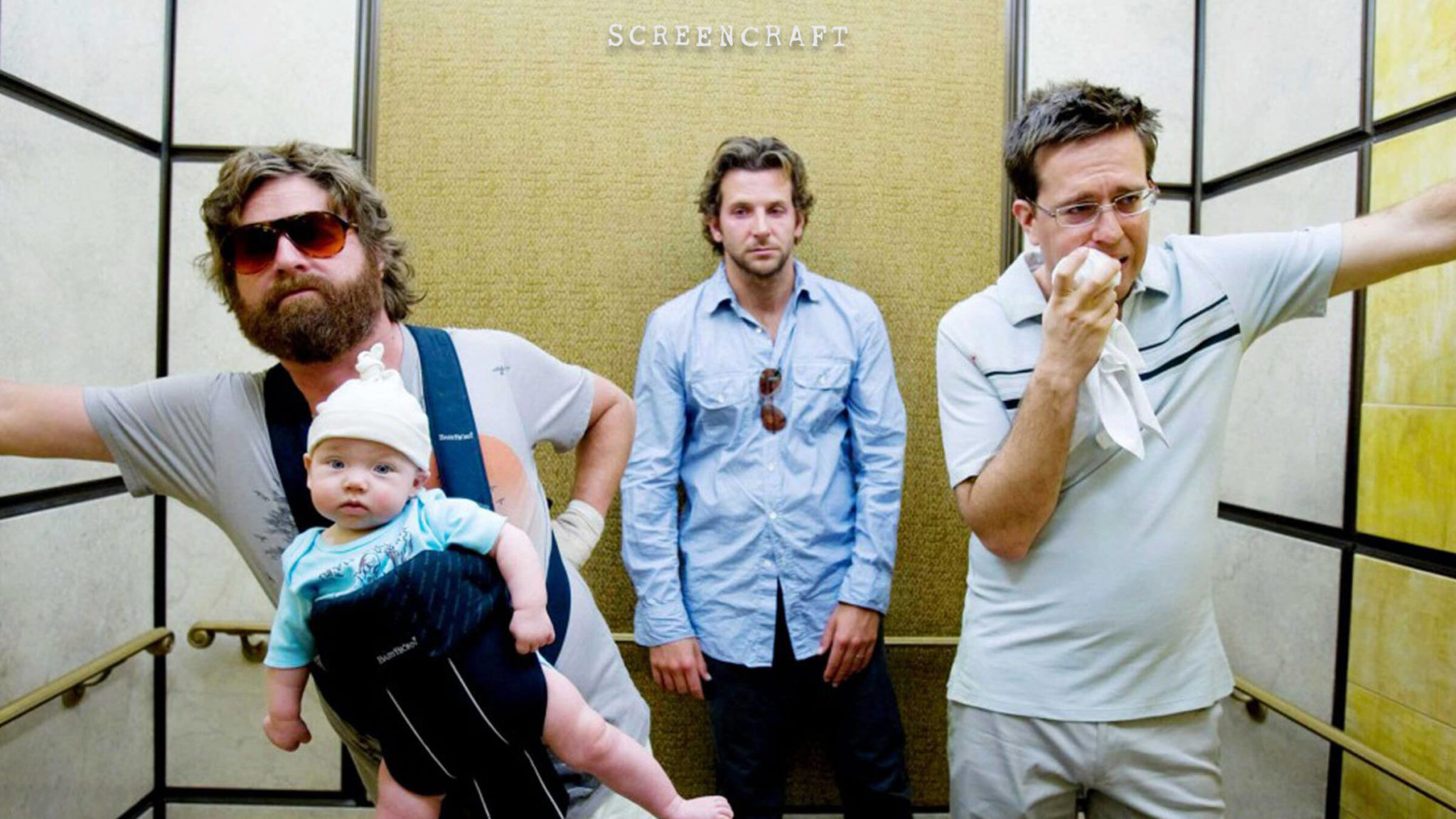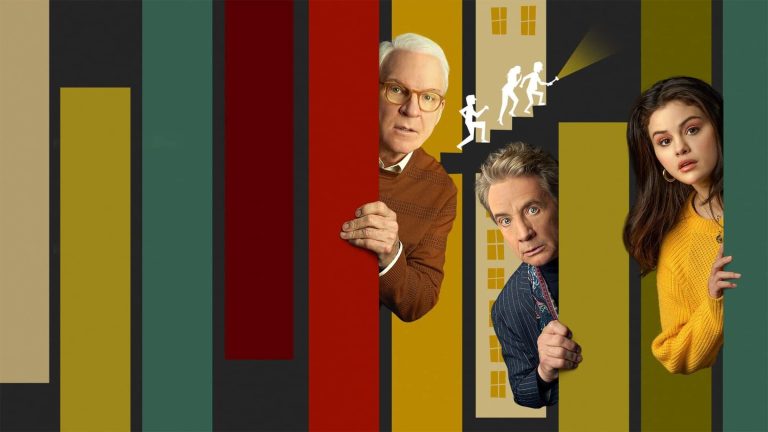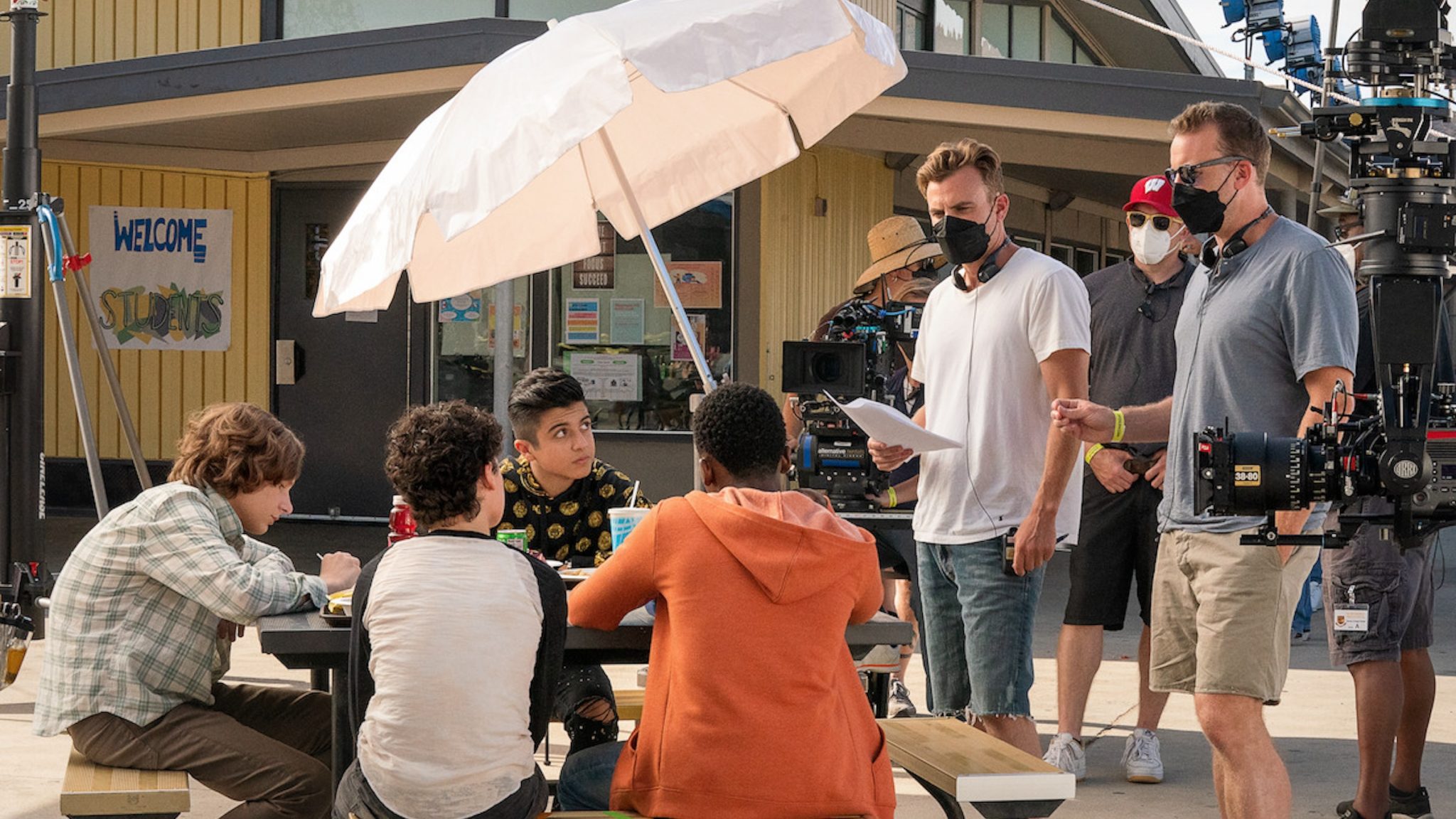What Hollywood Wants (and How to Give It to Them): High Concept Comedy
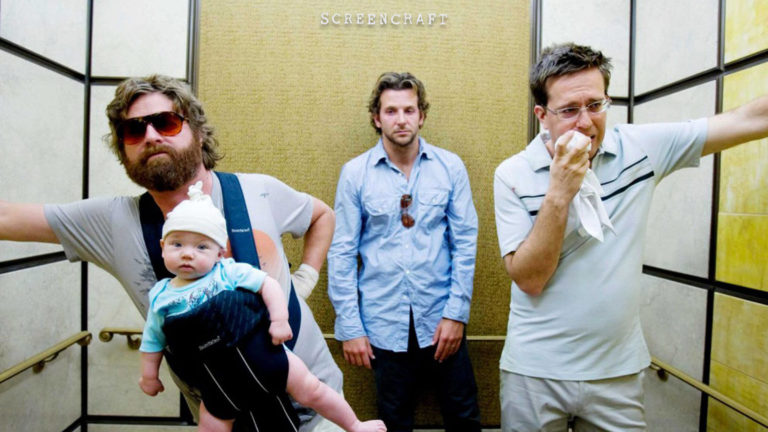
Welcome to the next installment of our new limited series What Hollywood Wants, where we cover the most desired genres and types of screenplays that Hollywood is most attracted to. Each post will cover a particular example of what Hollywood wants most in a spec script and break down the elements of each so you can learn how to write them.
The topic this time -- High Concept Comedies.
What Are High Concept Comedies?
High Concept Comedies are the most desirable types of comedies for major studios, production companies, and streamers.
They can be defined as a type of comedy that can be easily pitched with a succinctly stated premise, typically characterized by an overarching “What If…” or "Fish out of water" scenario that acts as a catalyst for the events and characterizations portrayed within the screenplay.
To put things into further perspective, a low concept comedy would be humor-driven scripts or dramedies that are more concerned with character development and other subtleties that are not as easily summarized — or they are more stylized as quirky dialogue-driven comedy. The indie market is full of dramedies and smaller-scale quirky comedies — usually involving talking head scenes (Dazed and Confused, Napoleon Dynamite, Palm Springs, etc.).
High Concept Comedies can be quirky. They can also have great character development (obviously). But they are more concept-driven.
Prime examples of High Concept Comedies include:
- Liar Liar
- Bridesmaids
- The Hangover
- Kindergarten Cop
- What Women Want
- Big
- Groundhog Day
- Beverly Hills Cop
- Bruce Almighty
If you read the loglines for these concepts, you'll see that they are concept-driven. You'll see that they can be easily pitched with a succinctly stated premise, typically characterized by an overarching “What If…” or "Fish out of water" scenario that acts as a catalyst for the events and characterizations portrayed within the screenplay.
What if a fast-track lawyer couldn't lie for 24 hours? (Liar Liar)
What if the maid of honor and a bridesmaid of an upcoming wedding feuded because each thought that they were the bride's best friend? (Bridesmaids)
What if three buddies woke up from a bachelor party in Las Vegas with no memory of the previous night and the bachelor missing? (The Hangover)
What if a tough LAPD cop was forced to pose as a kindergarten teacher to locate a dangerous criminal's ex-wife? (Kindergarten Cop)
What if a cocky, chauvinistic advertising executive had the ability to hear what women were thinking? (What Women Want)
What if a teenage boy's wish to be an adult came true? (Big)
What if an egotistical weatherman found himself inexplicably living the same day over and over again? (Groundhog Day)
What if a freewheeling Detroit cop had to pursue a murder investigation within the very different culture of Beverly Hills? (Beverly Hills Cop)
What if a guy who complains about God too often was given almighty powers to teach him how difficult it is to run the world? (Bruce Almighty)
Read More: 10 Character Archetypes in Comedies
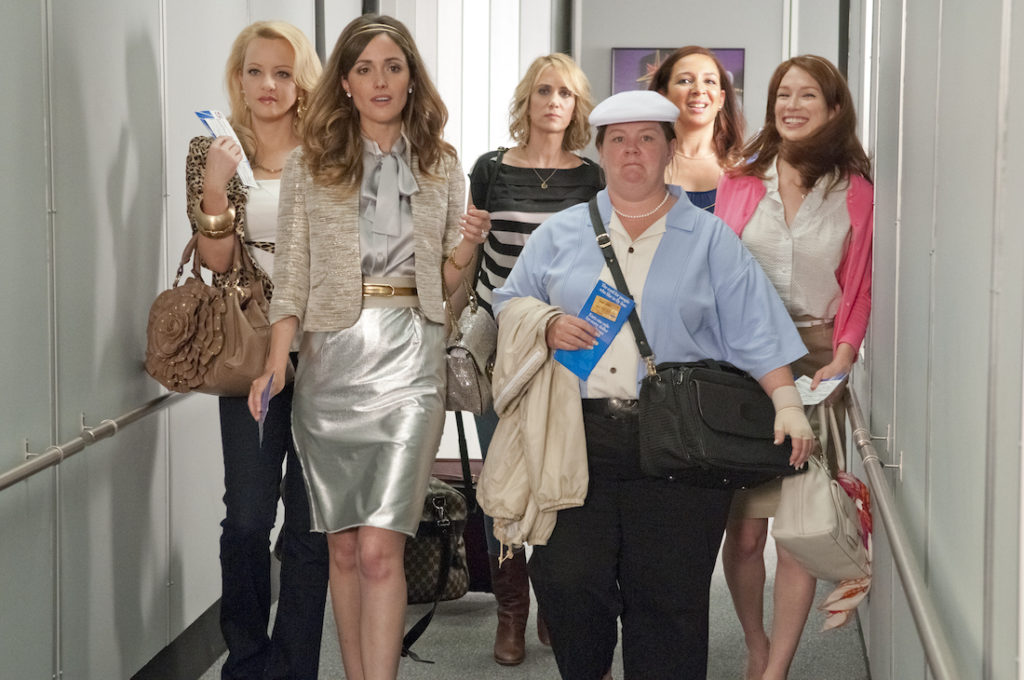
'Bridesmaids'
Why Do Major Studios and Production Companies Love High Concept Comedies So Much?
Laughter is universal. You put a character in a funny scenario, and hilarity ensues. And laughter is the best form of entertainment for the mass audience because it's the best type of escapism from the real world.
We love to laugh. And there's less risk involved with High Concept Comedies for the audience and the studios, production companies, and distributors because the concepts are easy to market, and the comedy is more universal and accessible.
More mass audience appeal means more box office revenue. And it's easier to cast A-List talent that can deliver on those laughs and bring in the largest audience base.
How Do Screenwriters Write High Concept Comedies?
The first step is to learn how to identify a high concept for a feature film. A film embraces the core concept and delivers on it throughout the course of a two-hour running time.
It's different for television and streamers.
A TV series builds on the initial season’s core concept through each season. The concept evolves. So with a TV series, the concept isn’t as important. Instead, compelling characters and the intriguing worlds they exist within are the driving factors.
HBO started the trend of focusing less on concept-driven shows and more on finding worlds that would be intriguing to television audiences.
The Sopranos (Mafia), Entourage (Hollywood A-list life), Barry (Struggling actors in Hollywood), Ballers (NFL superstar life), and Silicon Valley (Tech Industry).
Netflix (and other streamers) started to do the same with Orange Is the New Black (Women’s Prison), Narcos (Drug Cartels), Glow (Women’s Professional Wrestling circa the 1980s), and Ozark (the Missouri Ozarks), among many others.
Worlds aren't enough for features. Many screenwriters mix the differences between high concept features and high concept TV series pitches up.
Merely showcasing an intriguing or funny world in a feature isn't enough. The concept has to deliver within that short time frame of a feature-length film.
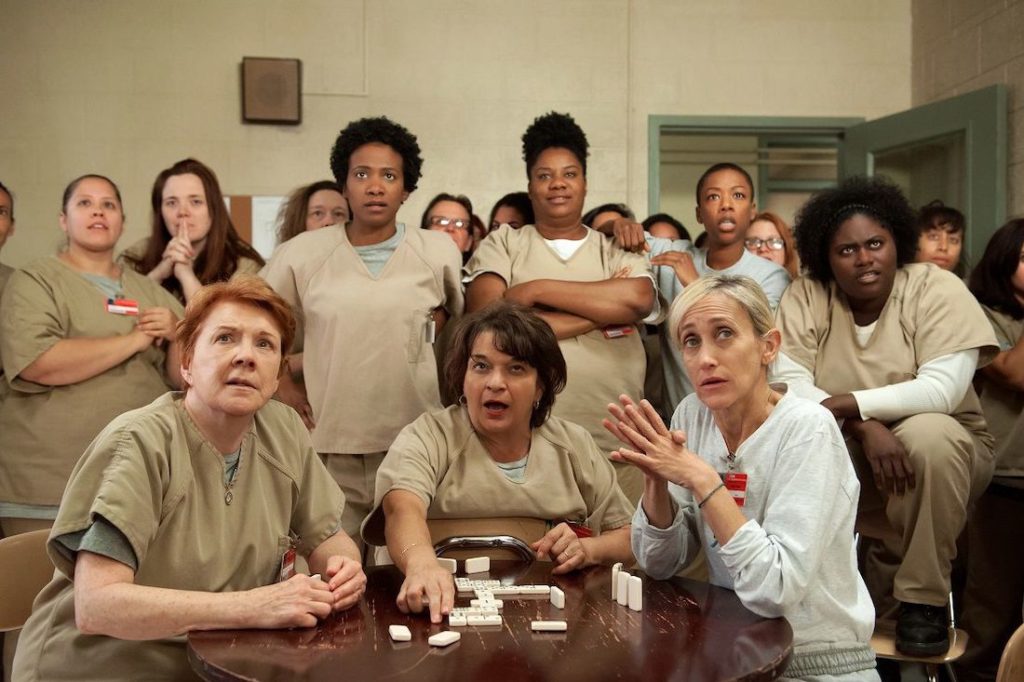
'Orange is the New Black'
Find the High Concept
The easiest guide to accomplishing this step is to search for those "What if..." and "Fish out of water" concepts. Have fun with it. Open a new document and start writing out intriguing scenarios and hilarious concepts.
- What's so absurd it would be hilarious?
- What characters don't belong in a certain environment or situation?
Search for what makes you laugh. You can't control what others will find funny. But you can trust that what makes you laugh will resonate with a good number of the population as well.
Need help getting those creative juices flowing? Read 101 Hilarious (or Slightly Amusing) Comedic Story Prompts.
Create Flawed but Likable Protagonists
It's actually not that difficult to create compelling characters within High Concept Comedies.
Give your protagonist flaws.
That's the easiest way to create depth. But at the same time, make sure that you balance that with likable characteristics.
In Liar Liar, Fletcher is a lawyer who has no problem lying to win or settle his cases. He also neglects his son because of the pressures of his job as he tries to impress his boss. However, he's an amazing father that loves his son very much. And when he finds the time to be with his son, there's no better father out there. That's a perfect balance of flaws and likeability.
In Bruce Almighty, Bruce is a charismatic and funny news anchor struggling to be taken more seriously. He's also a dedicated boyfriend that loves his girlfriend very much. However, he allows his career aspirations to cloud what is really important in life. And he questions the very faith that his girlfriend feels strongly about in her life.
In Bridesmaids, Annie is overly selfish as she struggles with jealousy and low self-esteem. She is also overly competitive when she feels threatened by her best friend's bridesmaid that seems to be one-upping her every chance she gets. We understand her feelings. While some of them are justified, we watch as Annie lets her jealousy and pettiness consume her to the point that she ruins every wedding planning experience of her best friend.
Show the Protagonist in Their Ordinary World
Showing your protagonist within their Ordinary World at the beginning of your story allows you to showcase how much the core conflict of the concept they face rocks their world.
We need to see them comfortable — and then uncomfortable.
We need to see their flaws in their ordinary world to see them grow outside of it.
This allows you to create and foreshadow the necessary elements of empathy and catharsis that your story needs.
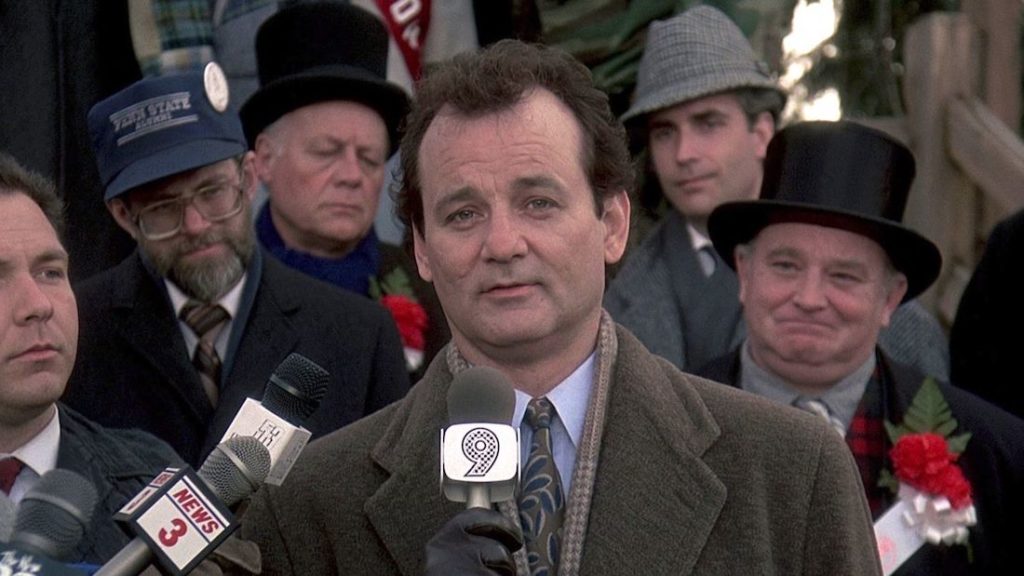
'Groundhog Day'
In Kindergarten Cop, we see Kimble as the rough and tough badass character we've seen in many Arnold Schwarzenegger movies. That's his ordinary world. But then he's forced to resist all of those instincts when he goes undercover as a Kindergarten teacher.
In Groundhog Day, we see Phil as an egotistical weatherman who wants nothing more than to get out of the small town he is forced to cover during Groundhog Day. When he is stuck in the loop of reliving the same day over and over within that town, we watch as he learns the error of his ways.
Showing your characters briefly in their ordinary world helps you prepare opportunities for character development and comedy because the best part of comedy is seeing a character react to things out of their control.
Continually Raise the Comedic Stakes
Raising the stakes in your High Concept Comedy offers you the ability to create more and more laughs.
The more conflict you have and the more the characters lose due to that conflict, the more the stakes are raised. And the more the stakes are raised, the more opportunities you'll have to inject comedic actions and reactions throughout your script.
As you conjure these conflicts to throw at your characters, you need to ask yourself these questions:
- What do my characters stand to lose through the central conflict?
- What do they stand to gain?
- What is at stake (freedom, lives, relationships)?
- What are the consequences of each and every action they take in reaction to the conflict at hand?
In The Hangover, the guys wake up after a wild bachelor party in Vegas. The catch is that they don't remember a thing. To make matters ten times worse, they can't find the groom. The comedic stakes are raised throughout the film.
- Stu is missing a tooth.
- There's a baby in the room.
- Mr. Chow is found in the trunk of their car.
- Alan confesses to spiking everyone's drinks to ensure they had a good time.
The stakes continue to pile up through the course of the story.
- They can't find the groom.
- The more they look for him, the more they discover about their forgotten night.
- The more they discover about their night, the more the stakes are raised due to increasing conflict.
And in comedies, that is where the hilarity shines. Every few pages, you're making matters even worse for the protagonist — which means there are more opportunities to continuing and evolving comedy.
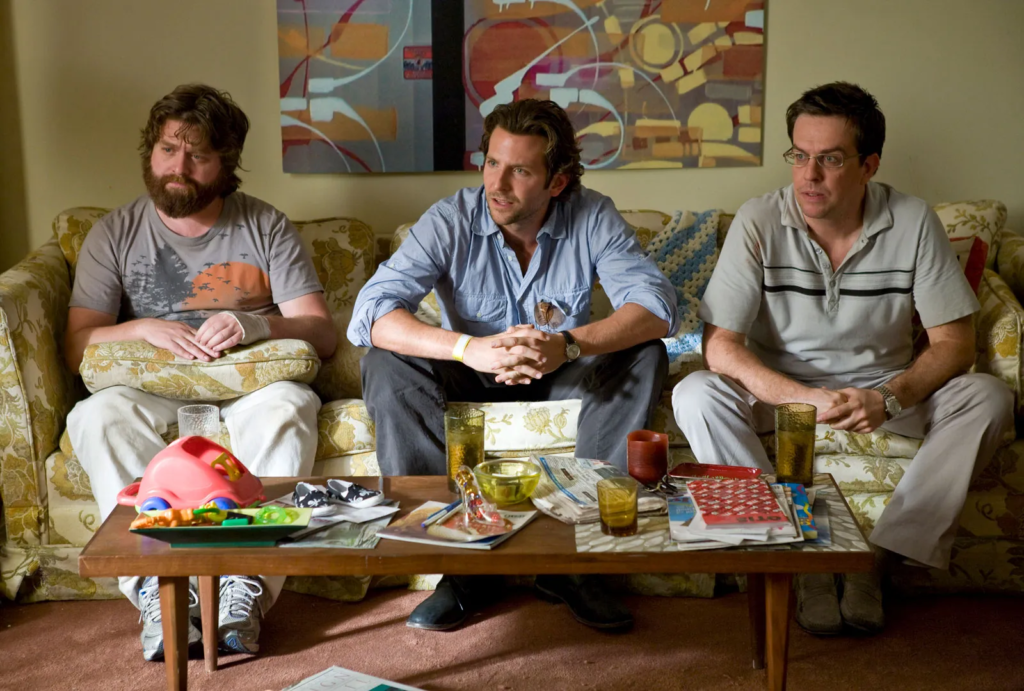
'The Hangover'
Play with Audience Expectations
Comedy cliches and tropes are aplenty. The secret to writing a High Concept Comedy that stands above and beyond the rest is using those comedy cliches and tropes to your advantage as the cinematic storyteller.
- Anticipate audience/reader expectations.
- Then go the opposite direction that they expect.
- Use cliches and tropes, knowing that audiences love them. But give them added hilarity by surprising them.
Conclusion
High Concept Comedies can be screenwriting gold. They are highly desirable.
- Find the High Concept
- Create Flawed but Likable Protagonists
- Show the Protagonist in Their Ordinary World
- Continually Raise the Comedic Stakes
- Play with Audience Expectations
Ken Miyamoto has worked in the film industry for nearly two decades, most notably as a studio liaison for Sony Studios and then as a script reader and story analyst for Sony Pictures.
He has many studio meetings under his belt as a produced screenwriter, meeting with the likes of Sony, Dreamworks, Universal, Disney, Warner Brothers, as well as many production and management companies. He has had a previous development deal with Lionsgate, as well as multiple writing assignments, including the produced miniseries Blackout, starring Anne Heche, Sean Patrick Flanery, Billy Zane, James Brolin, Haylie Duff, Brian Bloom, Eric La Salle, and Bruce Boxleitner, and the feature thriller Hunter’s Creed starring Duane “Dog the Bounty Hunter” Chapman, Wesley Truman Daniel, Mickey O’Sullivan, John Victor Allen, and James Errico. Follow Ken on Twitter @KenMovies
For all the latest ScreenCraft news and updates, follow us on Twitter, Facebook, and Instagram.
Get Our Screenwriting Newsletter!
Get weekly writing inspiration delivered to your inbox - including industry news, popular articles, and more!



